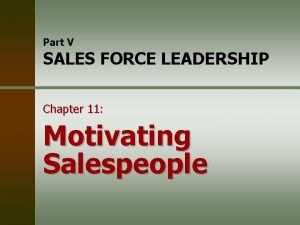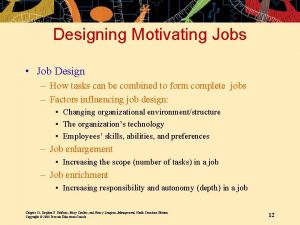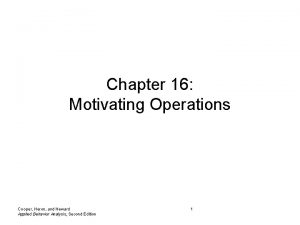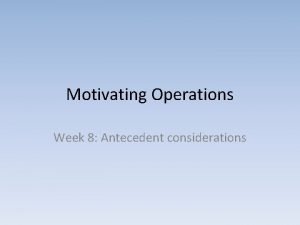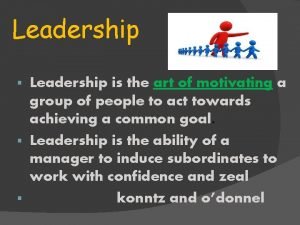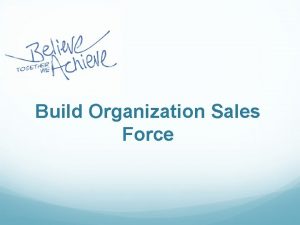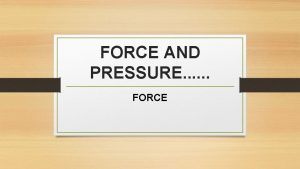Motivating the Sales Force One of the principal















- Slides: 15

Motivating the Sales Force

One of the principal roles of the sales manager is to motivate their subordinates. Most sales managers have been erstwhile sales persons But the role of a sales manager is distinctly different from that of a sales person

The role of a sales manager • The role of the sales manager is executing strategy • Selling is left to the sales person. Sales manager is supposed to lead supervise, guide, counsel, motivate and reward them to achieve their targets • Sales managers achieve their objectives by what their sales persons achieve. They are the voice of the company to their subordinates and also their sales persons voice to the company.

Competencies of high performing managers • • Having the will to win Speaking up and being decisive Recruits strong talent Develops and coaches people Adapts plan to local needs Promoting a winning culture Shares a vision of team success

Difference between good sales people and good sales managers • Listen to customers • Do it themselves • Strive for personal success • Control • Strive for strong quarterly performance • Focus on customer needs • Listen to salespeople • Allow others to perform • Strive for team success • Motivate • Strive for strong annual performance • Focus on customer

For a sales manager, one of the key tasks for him is to always keep the sales force highly motivated and optimistic to maximize productivity For this there are several tools available to him. Some have financial implications (salaries, commission, bonuses), others non-financial implications (growth opportunities, recognition, promotion)

Sales Compensation plans are designed to • • Increase sales force productivity Expand sales and market offerings Reformulate job roles Pursue new target markets

Motivation has three dimensions • Intensity – amount of physical and mental efforts put into the job • Direction – sales people choose where their efforts would be spent among various job activities • Persistence – choice to expend effort over time, especially during adverse conditions

Motivation can be • Intrinsic – interesting, rewarding, challenging • Extrinsic – salary, commissions, bonuses, incentives Rewards may be compensation rewards or noncompensation rewards

Good reward systems • Balance out the costs and salesperson’s output. The sales force must deliver value equal to or more than the costs of providing the incentive • Encourage specific activities consistent with the firm’s overall marketing and sales objectives and strategies • Attract and retain competent sales people, thereby promoting consistent customer relationships • Goals should be fair across territories, salespersons and divisions. They should be engaging and exciting.

Setting Realistic Goals • Goals should reflect activity importance and management priorities • Provide a benchmark for sales men performance • Should recognize territory and personal differences when evaluating performance • Should have the right element of ‘stretch’ Goals that are too easy to achieve or too difficult,

Financial Compensation • • Straight salary Straight commission Performance bonuses Salary plus incentives

Non financial compensation • • Opportunity for promotion Sense of accomplishment Opportunity for personal growth Recognition

Other forms of rewards • • Sales Contests Team compensation Global considerations Changing reward systems

Proportion of incentive pay to total compensation • There is no straight answer • An ideal compensation plan should not be having limitations to incentive earnings • Companies follow a variety of plans to suit their requirements • Normally commissions are paid out monthly, whereas bonuses are paid out quarterly or annually
 Sales force motivation theories
Sales force motivation theories Motivating sales force
Motivating sales force Hybrid sales force structure
Hybrid sales force structure Salesforce sales organization structure
Salesforce sales organization structure Discuss the nuances of sales letters.
Discuss the nuances of sales letters. Sales force composite
Sales force composite Sales quotas and territories
Sales quotas and territories Motivating parallelism
Motivating parallelism Motivating students to learn english
Motivating students to learn english Ways of motivating employees
Ways of motivating employees Designing motivating jobs
Designing motivating jobs Examples of cmo-t
Examples of cmo-t Multiple stimulus with replacement
Multiple stimulus with replacement Chapter 10 motivating and satisfying employees and teams
Chapter 10 motivating and satisfying employees and teams Motivating operations definition
Motivating operations definition Exploitative authoritative example
Exploitative authoritative example

